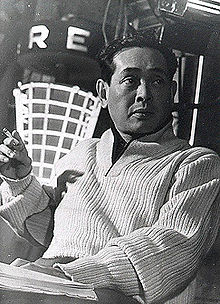Keisuke Kinoshita
Keisuke Kinoshita ( Japanese 木 下 恵 介 ; Kinoshita Keisuke ; born December 5, 1912 in Hamamatsu , Shizuoka , Japan ; † December 30, 1998 in Tokyo , Japan) was a Japanese film director , screenwriter and film producer .
biography
His father ran a grocery store. He was enthusiastic about films from an early age and attended a school for photography. From 1933 worked as a cameraman at Studio Shochiku, including for Yasujiro Shimazu . A few years later he worked as an assistant director and published his independent directorial debut in 1943 with Hana saku minato , with a comedy that humorously showed the difference between rural and urban people. After the propaganda film Rikugun , he retired from the film business until the end of World War II.
His breakthrough came in the 1950s with comedies and dramas, most of which were accompanied by the music of his brother Chuji Kinoshita . In particular, Carmen Returns , the first Japanese feature film in color, and the anti - war film Twenty - Four Eyes was extremely successful in Japan. His film Eien no hito was nominated for an Oscar in the category Best Foreign Language Film in 1962 . In 1964 he got out of Studio Shochiku and devoted himself to television series and films. From Sri Lanka no ai to wakare , which was created in 1976, he again mainly directed cinema films. In 1991 he was named Bunka Kōrōsha, a person with special cultural merits .
He died of a stroke in 1998 at the age of 86.
Filmography
- 1943 - Hana saku minato ( 花 咲 く 港 )
- 1943 - Ikite iru Magoroku ( 生 き て ゐ る 孫 六 )
- 1944 - Kanko no machi ( 歓 呼 の 町 )
- 1944 - Rikugun ( 陸軍 )
- 1946 - Waga koi seshi otome ( わ が 恋 せ し 乙 女 )
- 1946 - Osone-ke no ashita ( 大 曾根 家 の 朝 )
- 1947 - Kekkon ( 結婚 )
- 1947 - Fushichō ( 不 死鳥 )
- 1948 - Onna ( 女 )
- 1948 - Hakai ( 破戒 )
- 1948 - Shōzō ( 肖像 )
- 1949 - Ojōsan kanpai ( お 嬢 さ ん 乾杯 )
- 1949 - Yabure-daiko ( 破 れ 太 鼓 )
- 1949 - Shinshaku Yotsuya kaidan ( 新 釈 四 谷 怪 談 )
- 1950 - Konyaku yubiwa ( 婚約 指 輪 )
- 1951 - Zemma ( 善 魔 )
- 1951 - Carmen returns home ( カ ル メ ン 故 郷 に 帰 る , karumen kokyo ni kaeru )
- 1951 - Shōnenki ( 少年 期 )
- 1951 - Umi no hanabi ( 海 の 花火 )
- 1952 - Carmen's pure love Karumen junjo su ( カ ル メ ン 純情 す )
- 1953 - A Japanese tragedy Nihon no higeki ( 日本 の 悲劇 )
- 1954 - Onna no sono ( 女 の 園 )
- 1954 - Twenty-four eyes ( 二十 四 の 瞳 , nijushi no hitomi )
- 1955 - Toi kumi ( 遠 い 雲 )
- 1955 - Nogiku no gotoki kimi nariki ( 野菊 の 如 き 君 な り き )
- 1956 - Taiyō to bara ( 太陽 と バ ラ )
- 1957 - Fuzen no tomoshibi ( 風 前 の 灯 )
- 1957 - Yorokobi mo kanashimi mo ikutoshitsuki ( 喜 び も 悲 し み も 幾 歳 月 )
- 1958 - The ballad of Narayama ( 楢 山 節 考 , narayama bushiko )
- 1958 - Kono ten no niji ( こ の 天 の 虹 )
- 1959 - Sekishun-cho ( 惜春 鳥 )
- 1959 - Kazabana ( 風 花 )
- 1959 - Kyo mo mata kakute ari nan ( 今日 も ま た か く て あ り な ん )
- 1960 - Haru no yume ( 春 の 夢 )
- 1960 - The Fuefuki River Fuefukigawa ( 笛 吹 川 )
- 1961 - Eien no hito ( 永遠 の 人 )
- 1962 - Futari de aruita iku haru aki ( 二人 で 歩 い た 幾 春秋 )
- 1962 - Kotoshi no koi ( 今年 の 恋 )
- 1963 - Utae wakado-tachi ( 歌 え 若 人 た ち )
- 1963 - Shito no densetsu ( 死 闘 の 伝 説 )
- 1964 - Kōge ( 香 華 )
- 1967 - Natsukashiki fue ya taiko ( な つ か し き 笛 や 太 鼓 )
- 1976 - Sri Lanka no ai to wakare ( ス リ ラ ン カ の 愛 と 別 れ )
- 1979 - Shodo satsujin: Musuko yo ( 衝動 殺人 ・ 息 子 よ )
- 1980 - Chichi yo haha yo! ( 父 よ 母 よ! )
- 1983 - Children of Nagasaki ( こ の 子 を 残 し て , kono ko wo nokoshite )
- 1986 - Shin yorokobimo kanashimimo ikutoshitsuki ( 新 ・ 喜 び も 悲 し み も 幾年 月 )
- 1988 - Chichi ( 父 )
Web links
- Keisuke Kinoshita in the Internet Movie Database (English)
- Inner desires and outer compulsions , text about Keisuke Kinoshita's films on critic.de
| personal data | |
|---|---|
| SURNAME | Kinoshita, Keisuke |
| ALTERNATIVE NAMES | 木 下 恵 介 (Japanese) |
| BRIEF DESCRIPTION | Japanese film director, screenwriter and film producer |
| DATE OF BIRTH | December 5, 1912 |
| PLACE OF BIRTH | Hamamatsu , Shizuoka , Japan |
| DATE OF DEATH | December 30, 1998 |
| Place of death | Tokyo , Japan |
